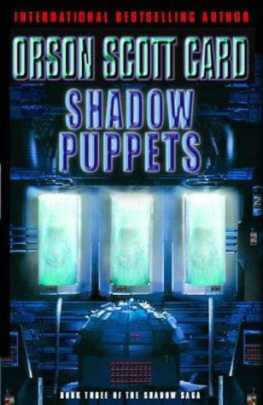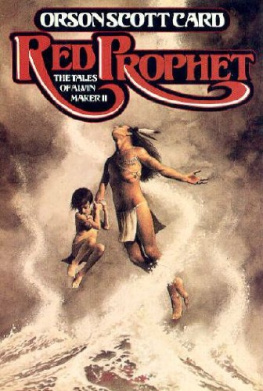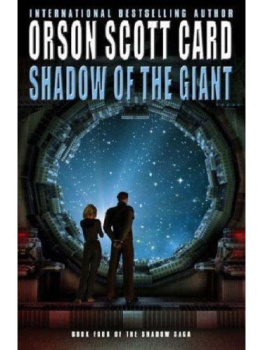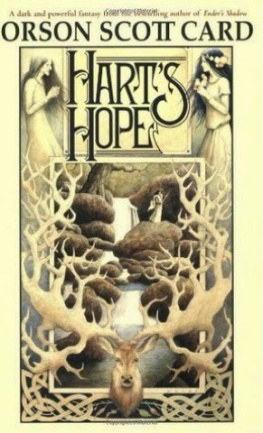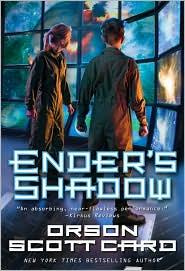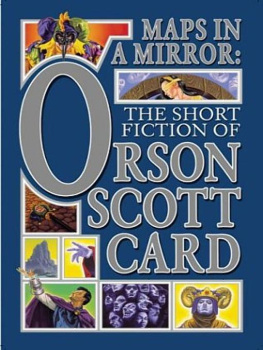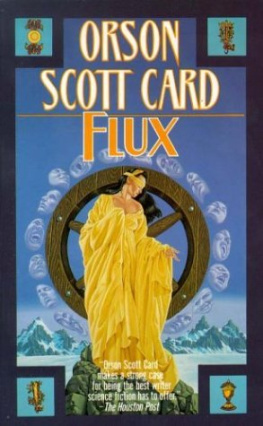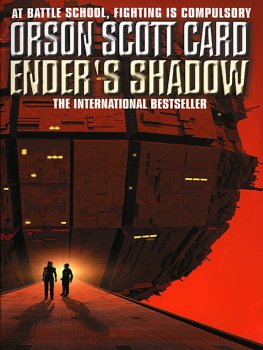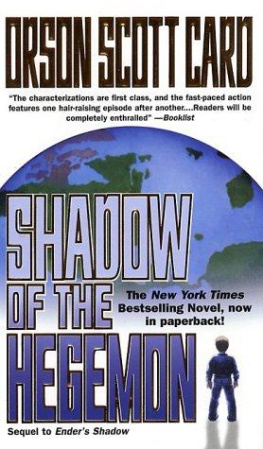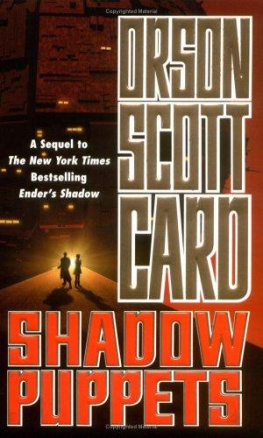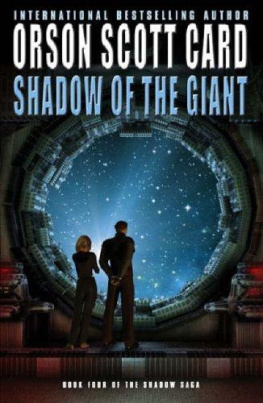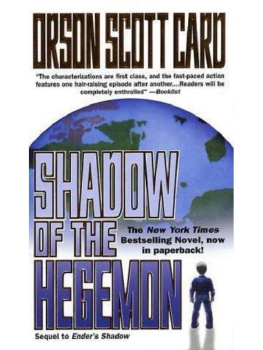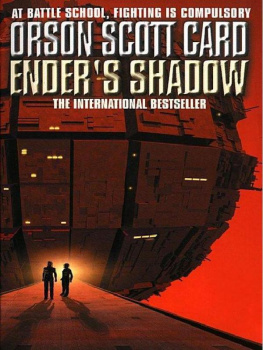Orson Scott Card
Shadow Puppets
CHAPTER ONE
GROWN
From: NoAddress@Untraceable.com #14h9cc0/SIGN UP NOW AND STAY ANONYMOUS!
To: Trireme%Salamis@Attica-vs-Sparta.hst
Re: Final decision
Wiggin:
Subj not to be killed. Subj will be transported according to plan 2, route 1. Dep Tue. 0400, checkpoint #3 @ 0600, which is first light. Please be smart enough to remember the international dateline. He is yours if you want him.
If your intelligence outweighs your ambition you will kill him. If vice versa, you will try to use him. You did not ask my advice, but I have seen him in action: Kill him.
True, without an antagonist to frighten the world you will never retrieve the power the office of hegemon once had. It would be the end of your career.
Let him live, and it is the end of your life, and you will leave the world in his power when you die. Who is the monster? Or at least monster #2?
And I have told you how to get him. Am I monster #3? Or merely fool #1?
Your faithful servant in motley.
Bean kind of liked being tall, even though it was going to kill him.
And at the rate he was growing, it would be sooner rather than later. How long did he have? A year? Three? Five? The ends of his bones were still like a child's, blossoming, lengthening; even his head was growing, so that like a baby he had a soft patch of cartilage and new bone along the crest of his skull.
It meant constant adjustment, as week by week his arms reached farther when he flung them out, his feet were longer and caught on stairs and sills, his legs were longer so that as he walked he covered ground more quickly, and companions had to hurry to keep up. When he trained with his soldiers, the elite company of men that constituted the entire military force of the Hegemony, he could now run ahead of them, his stride longer than theirs.
He had long since earned the respect of his men. But now, thanks to his height, they finally, literally, looked up to him.
Bean stood on the grass where two assault choppers were waiting for his men to board. Today the mission was a dangerous one -- to penetrate Chinese air space and intercept a small convoy transporting a prisoner from Beijing toward the interior. Everything depended on secrecy, surprise, and the extraordinarily accurate information the Hegemon, Peter Wiggin, had been receiving from inside China in the past few months.
Bean wished he knew the source of the intelligence, because his life and the lives of his men depended on it. The accuracy up to now could easily have been a set-up. Even though "Hegemon" was essentially an empty title now, since most of the world's population resided in countries that had withdrawn their recognition of the authority of the office, Peter Wiggin had been using Bean's soldiers well. They were a constant irritant to the newly expansionist China, inserting themselves here and there at exactly the moment most calculated to disrupt the confidence of the Chinese leadership.
The patrol boat that suddenly disappears, the helicopter that goes down, the spy operation that is abruptly rolled up, blinding the Chinese intelligence service in yet another country -- officially the Chinese hadn't even accused the Hegemon of any involvement in such incidents, but that only meant that they didn't want to give any publicity to the Hegemon, didn't want to boost his reputation or prestige among those who feared China in these years since the conquest of India and Indochina. They almost certainly knew who was the source of their woes.
Indeed, they probably gave Bean's little force the credit for problems that were actually the ordinary accidents of life. The death of the foreign minister of a heart attack in Washington DC only minutes before meeting with the U.S. President -- they might really think Peter Wiggin's reach was that long, or that he thought the Chinese foreign minister, a party hack, was worth assassinating.
And the fact that a devastating drought was in its second year in India, forcing the Chinese either to buy food on the open market or allow relief workers from Europe and the Americas into the newly captured and still rebellious subcontinent -- maybe they even imagined that Peter Wiggin could control the monsoon rains.
Bean had no such illusions. Peter Wiggin had all kinds of contacts throughout the world, a collection of informants that was gradually turning into a serious network of spies, but as far as Bean could tell, Peter was still just playing a game. Oh, Peter thought it was real enough, but he had never seen what happened in the real world. He had never seen people die as a result of his orders.
Bean had, and it was not a game.
He heard his men approaching. He knew without looking that they were very close, for even here, in supposedly safe territory -- an advance staging area in the mountains of Mindanao in the Philippines -- they moved as silently as possible. But he also knew that he had heard them before they expected him to, for his senses had always been unusually keen. Not the physical sense organs -- his ears were quite ordinary -- but the ability of his brain to recognize even the slightest variation from the ambient sound. That's why he raised a hand in greeting to men who were only just emerging from the forest behind him.
He could hear the changes in their breathing -- sighs, almost-silent chuckles -- that told him they recognized that he had caught them again. As if it were a grownup game of Mother-May-I, and Bean always seemed to have eyes in the back of his head.
Suriyawong came up beside him as the men filed by in two columns to board the choppers, heavily laden for the mission ahead.
"Sir," said Suriyawong.
That made Bean turn. Suriyawong never called him "sir."
His second-in-command, a Thai only a few years older than Bean, was now half a head shorter. He saluted Bean, and then turned toward the forest he had just come from.
When Bean turned to face the same direction, he saw Peter Wiggin, the Hegemon of Earth, the brother of Ender Wiggin who saved the world from the formic invasion only a few years before --Peter Wiggin, the conniver and gamesman. What was he playing at now?
"I hope you aren't insane enough to be coming along on this mission," said Bean.
"What a cheery greeting," said Peter. "That is a gun in your pocket, so I guess you aren't happy to see me."
Bean hated Peter most when Peter tried to banter. So he said nothing. Waited.
"Julian Delphiki, there's been a change of plans," said Peter.
Calling him by his full name, as if he were Bean's father. Well, Bean had a father -- even if he didn't know he had one until after the war was over, and they told him that Nikolai Delphiki wasn't just his friend, he was his brother. But having a father and mother show up when you're eleven isn't the same as growing up with them. No one had called Bean "Julian Delphiki" when he was little. No one had called him anything at all, until they tauntingly called him Bean on the streets of Rotterdam.
Peter never seemed to see the absurdity of it, talking down to Bean. I fought in the war against the Buggers, Bean wanted to say. I fought beside your brother Ender, while you were playing your little games with rabble-rousing on the nets. And while you've been filling your empty little role as Hegemon, I've been leading these men into combat that actually made a difference in the world. And you tell me there's been a change of plans?
"Let's scrub the mission," said Bean. "Last-minute changes in plan lead to unnecessary losses in battle."
"Actually, this one won't," said Peter. "Because the only change is that you're not going."
Next page
